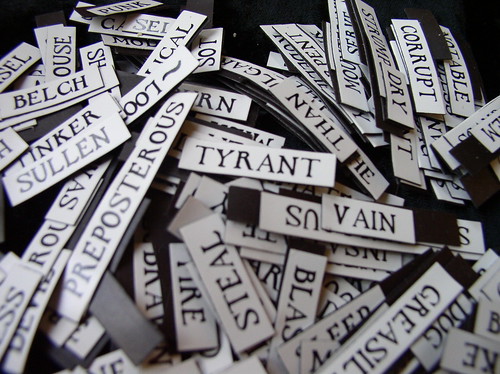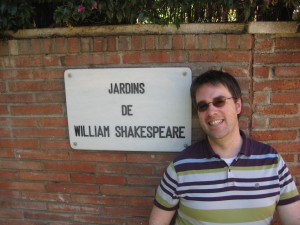Since I started the MET program in 2010, Shakespeare’s plays have been central to my studies, and over the summer two experiences have brought home the importance for teachers to learn about the words he used. The first was an exciting course at UBC, partially taught on-line (but also some much-needed f2f classroom time) on the Theory and Pedagogy of Adaptation, which had a whole week on Shakespeare! Not only are his plays adaptations of classical texts, with a few contemporary cultural references added, but also they are the most adapted literary resource worldwide: various forms of theatre, radio, film, YouTube, mobile apps, anime and manga (as well as the pictured refrigerator magnets!). While many of these resources may be “caviary to the general” (Hamlet II, ii, 435-6) and even more confusing than the battered-down textbooks many students encountered in high school, I hope to continue working towards an effective way of teaching the plays.
This leads to the second summer experience, where I got to attend and to do an oral presentation at the EDULEARN12 conference in Barcelona, Spain. It was the first time attend an international education conference, largely due to the Conference Travel Grant offered by the MET program, and it was a wonderfully engaging event. My topic was Creating a Virtual Learning Environment for Shakespeare’s Plays, and while it will take an angel investor or two to get this VLE designed for classroom use, I am pleased to report that my oral presentation was a conversation starter with some very impressive academics. It was during this conference that I learned about the collection of First Folios (the original printed collection of Shakespeare’s plays, published in 1623) owned by Meisei University in Japan. One of their projects, and hopefully I can get in it for my post-graduate degree, is to digitize their collection, making Shakespeare’s words free for everyone… who happens to have access to the Internet. My interest in this course will be the process, or rather the technology, of the printed word, and how it can be adapted for on-line instructional use.
Looking forward to exploring more of both text and technology,
Kyle




Hi, Kyle. This is either the second or third course we’ve been in together now. I just wanted to give you some kudos for having such a strong focus / personal interest. You always connect things back to your Shakespeare / literary background (and what a course for you this time), and I think that’s great.
Cheers!
Steve
Hi again, Steve,
Yes, I have lost track of the times that our educational paths have joined together, but very happy to see you in both this course and ETEC 590. It is really exciting to have lots more to learn about text in this course, building upon my experience in LLED 565A this summer. Expect lots more Shakespearean tidbits from me, especially as I have gained more knowledge since the conference in Spain on the printing of Shakespeare’s First Folios, and I am very keen to continue this line of study all the way to Meisei University in Japan.
Nice to see your flickr image makes good use of the copious elephant metaphors, and reminds me of the discovery of Evernote most of us made in ETEC 522!
Kyle